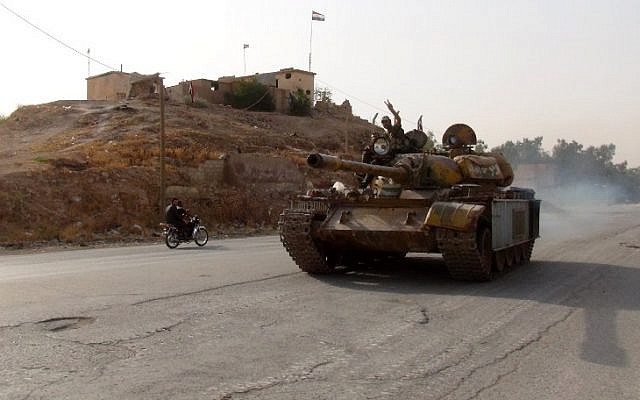Having fought and bled for the regime’s survival, Tehran looks to cash in its support for a Mediterranean naval base, air bases and even uranium mining concessions

A little over a month ago, the Iranian chief of staff, Gen. Mohammad Hossein Bagheri, paid an unusual visit to Damascus. It was intended as a display of Syrian-Iranian amity, an expression of the excellent cooperation between the two partners in the drawn-out fight against opposition fighters and the Islamic State group.
Bagheri took the trouble to announce that the objective of his visit was to strengthen coordination in the war against “the enemies… be they Zionists or terrorists.” He added that he and his Syrian counterpart, Gen. Ali Abdullah Ayoub, had sketched out the “basic principles of this cooperation.”
Yet, from Iran’s perspective, Bagheri’s visit to the Syrian capital was not a success. Damascus was less than eager to accede to the list of demands reiterated yet again by Iran: a 50-year lease on a Mediterranean naval base, the establishment of air bases on Syrian soil, phosphate mining concessions including for uranium, and so on.

To be sure, Syria did not reject the Iranian requests outright, but, in a surprise move for Israeli observers, it did make clear that it prefers to advance slowly and cautiously when it comes to submitting to Iran’s embrace.
There are a number of reasons for Syrian President Bashar Assad’s wariness in the face of Tehran’s demands. Love of Israel is not among them.
That isn’t to say the Syrian president has suddenly developed a backbone vis-a-vis his Iranian benefactors. But Assad does seem to understand that a tight embrace from Tehran could come at a great cost — both in terms of his enemy Israel and his most powerful ally, Russia.
Tehran had good reason to hope Assad would green-light the long list of demands it presented in recent weeks to Damascus. In many ways, Assad owes his survival to the Iranians and their proxy, the Hezbollah terror group. Dozens if not hundreds of Iranian soldiers have been killed over the past six years of fighting in the Syrian civil war, as well as some 2,000 members of Hezbollah, which is mostly funded by Tehran. This was in addition to the efforts of thousands more Shiite fighters sent to Syria by Iran and mercenaries hailing from Iraq, such as the members of the al-Nujba militia, Pakistan and Afghanistan.

Ahough the Iranian demands may sound preposterous to Israeli ears, they can seem eminently reasonable when one considers what the Russians got out of Assad, including a naval base on the Mediterranean, an air base and more.
Given all these factors, officials in Tehran might reasonably view their demand for cellular phone tenders, phosphate concessions or a Mediterranean naval base as entirely sensible.
But the Iranians apparently did not take into account the fact that Assad owes just as much, and perhaps more, to Moscow. And while Russia and Iran share an interest in Assad’s survival, their interests diverge when it comes to the degree of clout Tehran can be allowed to wield over Syria. Iranian influence is seen in many capitals around the world as a destabilizing factor in the region – and thus is an indirect threat to Assad’s survival.

The heavy price Iran has paid in blood and treasure drove a complex debate in Tehran over the Syrian question. The Iranians believe their entry into the civil war was meant, first of all, to ensure the survival of an ally. But as time went on and the death toll and expense of the venture rose, an appetite developed in Tehran to find ways by which Assad’s survival can be made to serve additional Iranian interests — not just Russian or Alawite ones.
Meanwhile, the heads of the Revolutionary Guard see in the conclusion of the Syrian war a one-off opportunity to create an Iranian land bridge from Tehran to the Mediterranean. On the other hand, the camp of Iranian President Hassan Rouhani has urged a much more careful approach. His allies argue that Iranian over-involvement in the Syrian crisis could bring the international community to zero in anew on Iran’s negative influence in the region, and could even harm the Iranian economy by triggering new economic sanctions.
For now, it seems the Revolutionary Guard is winning the argument. Tehran’s efforts to completely absorb Syria into the Iranian sphere of influence are continuing apace, and even accelerating. One of the last bastions not under Iran’s direct influence lies on Syria’s eastern flank, where battles still rage between IS, the Syrian Democratic Forces (mostly Kurds supported by the United States), Shiite militias and the Syrian army. If the Americans scale back their presence there, the Iranians may finally achieve their long-sought land bridge.
Yet, even if that happens, Assad, like his allies in Moscow, understands from messages passed directly and indirectly by Israel that acquiescing fully to Iranian pressure could lead to escalation and even war with the Jewish state.

Israel has already characterized the establishment of rocket manufacturing facilities in Syria as an unacceptable development. If Moscow’s overriding interest in Syria is to ensure Assad’s survival, it understands that it may be necessary to limit Iran’s influence to the extent required to prevent Israel from stepping in with its own designs.
In the meantime, Israel doesn’t seem to believe that Assad’s goodwill is sufficient to ensure that this doesn’t happen. Assad needs the Iranians, and even if he is loath to grant them their every desire, he is nevertheless certain to concede a great deal.
He already permits the use of Syrian soil for explicitly anti-Israel activities, granting Hezbollah and other Shiite militias the right to operate in his territory, giving them free access to war materiel, and so on. The Shiite militias, meanwhile, are openly taking advantage of this largess to build up capabilities against Israel on Syrian soil, with a focus on developing military assets on the Syrian Golan that could threaten Israel – an act that carries the very real threat of escalation.
Recently, representatives of various Shiite militias (the Fetamiyun, Haidariyun and Zaynabiyun) visited Lebanon. Why would commanders from far-flung Iraq or other Middle Eastern countries be visiting the country? The most likely answer is also the most obvious: for the same reason that they seem eager to establish a presence on the Golan Heights.
Last week, Hashem Musawi, a spokesman for the al-Nujba movement (another name for Iran’s Iraqi Shiite militias), announced that his movement planned to establish a “Syrian Golan Liberation” brigade, and that the move was in coordination with the Syrian government. If Israel were to launch a war with Lebanon, he pledged, the brigade’s men would join the fight against Israel at Hezbollah’s side. For all his caution, Assad may already be on the path to an Israeli intervention.



Leave a Reply
You must be logged in to post a comment.